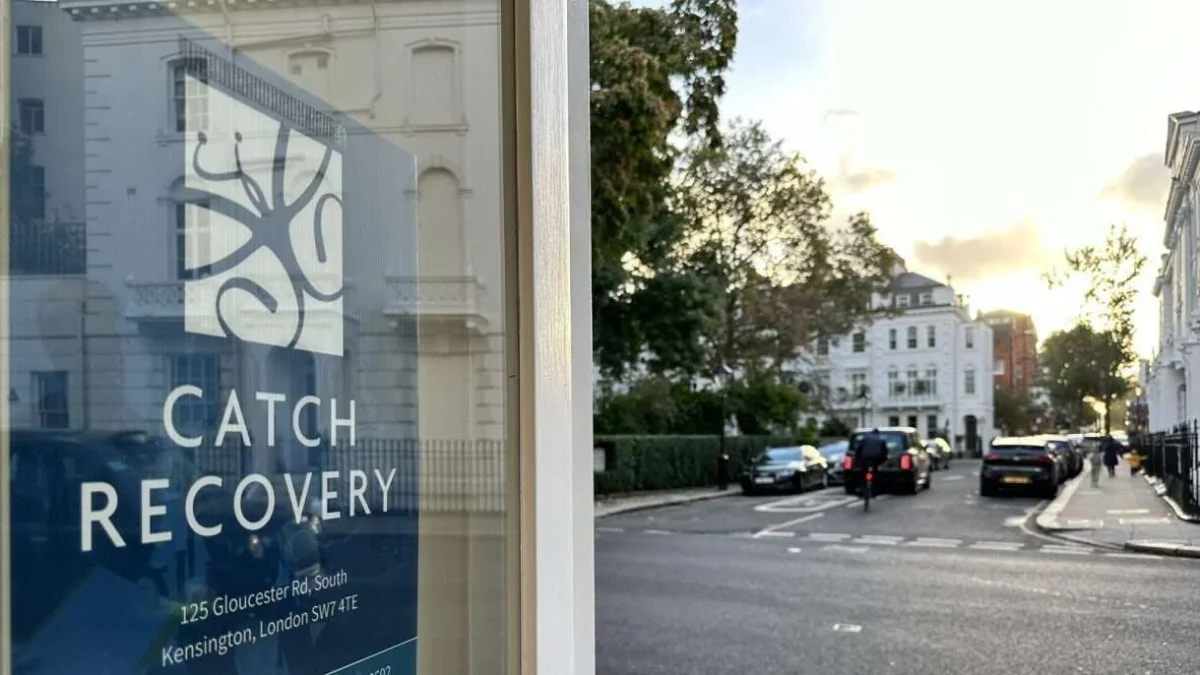
Find Help for Substance Misuse near Wandsworth
Our Specialist Addiction Services
This page introduces the services that we provide to the people of Wandsworth. At CATCH Recovery we offer a number of specialist addiction services for those outside of our immediate locality in central London to access our private addiction practice:
- Psychiatrist assessments and clinical screenings,
- Specialist addiction assessments,
- Private CBT and DBT sessions, with a specialist therapist,
- 12 Step recovery programmes,
- Referral for private detoxification from drugs and alcohol,
- Private residential rehab,
- Addiction counselling online from all locations,
- Sober transportation.
Our treatment is primarily based on an outpatient basis, which means that you can access our addiction psychotherapists, psychiatrists, and recovery coaches from Wandsworth or anywhere in the UK or Europe. We do offer information on drug and alcohol detox and rehab at our sister residential rehab clinics, if diagnosed as appropriate.
Alcohol and Drug Misuse Problems, Wandsworth
Between 2018 and 2021, there were 985 hospital admission episodes related to alcohol-related conditions. Additionally, estimates suggest that during 2018–2019, there were approximately 670 adults with alcohol dependence living with children in Wandsworth, and during 2014–2015, there were approximately 288 adults with opiate dependence living with children. These figures highlight the significant impact of substance misuse on people battling an addiction and families within the Wandsworth community. It emphasises the significance of specialised support and interventions to meet the unique needs of those suffering from alcohol and opiate dependence, particularly when raising children.
Addiction counselling plays a vital role in addressing these wide-ranging consequences, echoing the global impact of addiction.

Download Brochure
Spotting the Signs of An Addiction
Identifying the symptoms of addiction is a vital step in providing timely assistance and support. Common signs include compulsions, loss of control, increased tolerance, withdrawal symptoms, neglected responsibilities, relationship difficulties, loss of interest, secrecy and deception, financial problems, and physical and mental health issues.
It’s worth noting that addiction frequently accompanies underlying factors such as childhood trauma, abuse, and pre-existing mental health conditions.
Types of Addiction Counselling
At CATCH Recovery, we understand the diverse needs of people seeking addiction counselling. Each option has its advantages and disadvantages, and you will be able to choose the best approach with your specific circumstances.

Private Addiction Counselling
Private counselling provides one-on-one sessions with an experienced therapist, allowing for personalised attention and tailored treatment plans. This approach enables a deeper exploration of underlying issues and a focused approach to recovery. However, it is important to consider that private counselling may involve higher costs and may not be accessible to everyone due to financial constraints.

Online Addiction Counselling
Our online sessions have gained popularity as a convenient and flexible option for receiving addiction counselling. They provide the opportunity to participate in therapy from the comfort of their own homes, eliminating geographical barriers and offering increased accessibility. Online sessions can be particularly beneficial for those facing logistical challenges or seeking a more discreet option. However, it is essential to ensure a stable internet connection and consider potential limitations in non-verbal communication compared to face-to-face sessions.

Group Therapy
Group therapy for addiction brings those struggling with substance misuse together to share experiences and support each other in recovery. Led by a trained therapist, our participants can safely discuss their challenges, triggers, and progress in recovery. This collective setting fosters mutual support, reduces isolation, and helps clients to learn coping strategies through shared insights, promoting lasting recovery.
The Role of the Therapist in Addiction Counselling
In addiction counselling, the presence of a therapist is indispensable. These highly skilled professionals provide essential guidance and unwavering support during recovery. Their expertise helps delve into deep-seated trauma, confront underlying issues, and cultivate healthy coping mechanisms. In cases of dual diagnosis, where addiction intersects with mental health concerns, therapists play a critical role in effectively managing both aspects concurrently.
Evidence-Based Therapies
At CATCH Recovery, we are committed to utilising evidence-based therapies to maximise the effectiveness of addiction counselling. Our comprehensive approach includes:
- Cognitive-behavioural therapy (CBT): This therapeutic approach targets negative thought patterns and behaviours associated with addiction. You can develop healthier coping strategies and create lasting change by identifying and challenging these patterns.
- Dialectical Behaviour Therapy (DBT): DBT combines acceptance and change strategies to help regulate your emotions, develop effective coping skills, and foster a balanced and fulfilling life.
- Group therapy: Group sessions provide invaluable peer support, encouragement, and a sense of community. Sharing experiences and challenges in a group setting can be transformative, creating a supportive environment for growth and recovery.
- Family therapy: Involving the family in recovery can strengthen relationships, address familial dynamics, and create a supportive foundation for sustained recovery. Family therapy plays a crucial role in long-term healing by addressing family dynamics and enhancing communication.
- Couples therapy: Can be instrumental in rebuilding trust, improving communication, and fostering healthier partnerships. It offers a safe space for couples to work through challenges and establish a solid foundation for lasting recovery and relationship growth.

Take Control of Your Addiction Today
How Effective is Addiction Counselling?
The success of addiction counselling depends on various factors. Firstly, your readiness and willingness to change play a vital role in determining the treatment outcomes. Additionally, the quality of therapy delivered by the counsellor, their expertise, and the establishment of a strong therapeutic relationship all greatly influences the effectiveness of the treatment. Lastly, finding a therapy approach that suits your specific needs and preferences is crucial to facilitate a successful recovery journey.
What to Expect from Addiction Counselling Near Wandsworth
The CATCH Recovery model guides CATCH’s outpatient addiction counselling programme. This holistic framework encompasses five essential principles: Connection, Acceptance, Transformation, Continuity, and Hope. By integrating evidence-based therapies, holistic care, and ongoing support, we empower you to achieve sustainable long-term recovery.
At CATCH, we partner with a network of medical professionals, psychiatrists, and support organisations to provide comprehensive care. This multidisciplinary approach ensures you receive comprehensive support, addressing their physical, psychological, and emotional well-being.
Our dedicated team of therapists and clinicians is committed to supporting you on your path to recovery. With our expertise and compassionate approach, we provide the necessary tools and guidance to overcome addiction and rebuild lives.

Support Groups Near Wandsworth
Support groups are significant in recovery, offering a vital source of support and empathy.
Wandsworth Community Drug And Alcohol Service supports individuals struggling with drug and alcohol addiction. Due to COVID-19, face-to-face contact is limited, and ongoing sessions will be conducted via telephone or video call. The service prioritises three essential elements of treatment: opiate substitution therapy, needle exchange, and treatment of alcohol and GBL dependence. Other services include substance prescribing, relapse prevention prescribing, overdose training, and access to inpatient detoxification.
West Hill is available for up to eight people over 18 eligible for services in the borough, including treatment and housing. Clients must have achieved at least four weeks of abstinence from drugs and alcohol and can be referred through self-referral or via other agencies.
The Young People’s Health Agency in Wandsworth, London, offers free assessments and counselling for alcohol addiction across the borough. Six counselling sessions come after the initial assessment and creating a care plan. The service targets those not meeting the Children’s and Adolescent Mental Health Service criteria.
The Wandsworth & Richmond Day Programme offers support, advice, and treatment for drug and alcohol addiction. The service is available to anyone aged 18 and above who is concerned about their own or someone else’s substance use and offers a range of treatments and programmes, including structured day programmes, group and one-on-one work, alcohol-specific services, outreach, counselling, and access to education, training, and employment support. The service is open Monday to Friday from 9 am to 8 pm and on Saturdays from 10 am to 2 pm.
Hestia Wandsworth Drug and Alcohol Service provides floating support services to people living in Wandsworth who have had a problem with drugs or alcohol. The support can include practical housing-related help, emotional support, and finding employment, training, and educational resources. The service is for people who are single and aged 25+, experiencing issues around drugs and/or alcohol but motivated and engaged in treatment, eligible for housing benefits, living or normally staying in Wandsworth, homeless but not seen as having priority needs, and requiring support with independent living but able to maintain a tenancy with low to medium support.
Alcoholics Anonymous (AA) is a fellowship of men and women who share their experience, strength, and hope with each other so that they may solve their common problem and help others recover from alcoholism.

Find Out if Outpatient Therapy Is Right for You
-
Wandsworth East Hill
Wednesday
Hall next to St Mary Magdalen Church, 96 Northside, Wandsworth Common
Time: 20.00 – duration 1hr
-
Earlsfield Daily Reflections Meditation
Thursday
Earlsfield Baptist Church, 271 Magdalen Rd
Time: 19.00 – duration 1hr
Narcotics Anonymous is a non-profit fellowship or society of men and women for whom drugs have become a major problem. The helpline is open from 10 a.m. to midnight.
Telephone: 0300 999 1212
-
It Works – NA Literature
Monday19:00 ~ 20:00
Brathway Hall, Brathway Road, Southfields, SW18 4BE
Al-Anon family groups provide support for those affected by someone else’s drinking.
At CATCH Recovery, we recognise the significance of ongoing support during the initial stages of recovery, alongside the invaluable contribution of 12-step support groups. As part of our CATCH Recovery programme, we provide a sober companion service. This service offers additional support and accountability, guiding you through the daily challenges of maintaining sobriety and avoiding addictive behaviours. Having a sober companion during this vulnerable period can provide crucial reassurance, practical guidance, and emotional support, greatly enhancing the chances of maintaining long-term sobriety and achieving lasting recovery.
FAQs
How do I find a suitable therapist?
The high demand for addiction specialists makes it difficult to locate one. But groups like the British Association for Counselling and Psychotherapy (BACP) can point you in the right direction by providing information and referrals. If you need therapy, you can also get assistance from the CATCH team in locating a qualified professional closer to Wandsworth.
What is the most effective psychological treatment for addiction?
While there is no one-size-fits-all solution, a combined approach that includes evidence-based therapies, individualised support, and ongoing care tends to produce positive results. Due to its focus on individualised care, private therapy typically provides more support and better patient outcomes.
How long should I attend therapy?
The length of time spent in treatment differs from patient to patient based on several factors, including the extent of the addiction, the rate of improvement, and the patient’s desired result. A therapist can devise a treatment plan specifying a reasonable therapy session schedule with the patient’s input.